新概念2 Lesson 50Taken for a ride教学课件(共72张PPT)
文档属性
| 名称 | 新概念2 Lesson 50Taken for a ride教学课件(共72张PPT) |  | |
| 格式 | pptx | ||
| 文件大小 | 5.7MB | ||
| 资源类型 | 教案 | ||
| 版本资源 | 新概念英语 | ||
| 科目 | 英语 | ||
| 更新时间 | 2024-03-23 15:07:05 | ||
图片预览

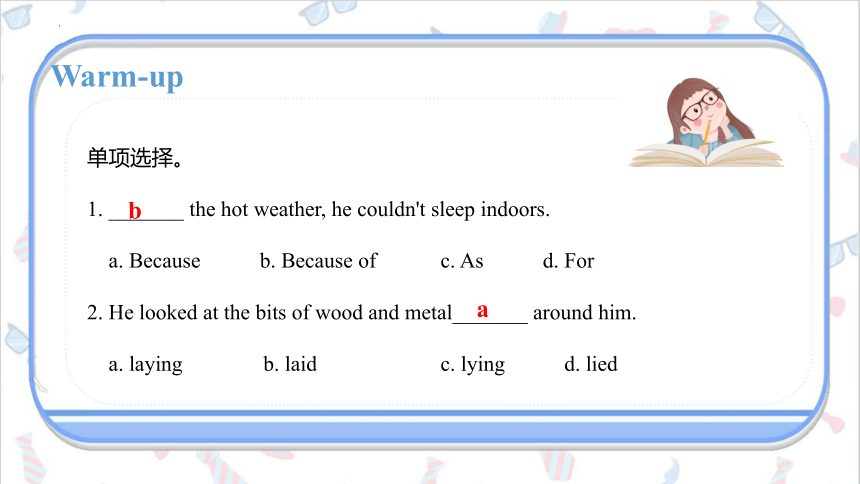
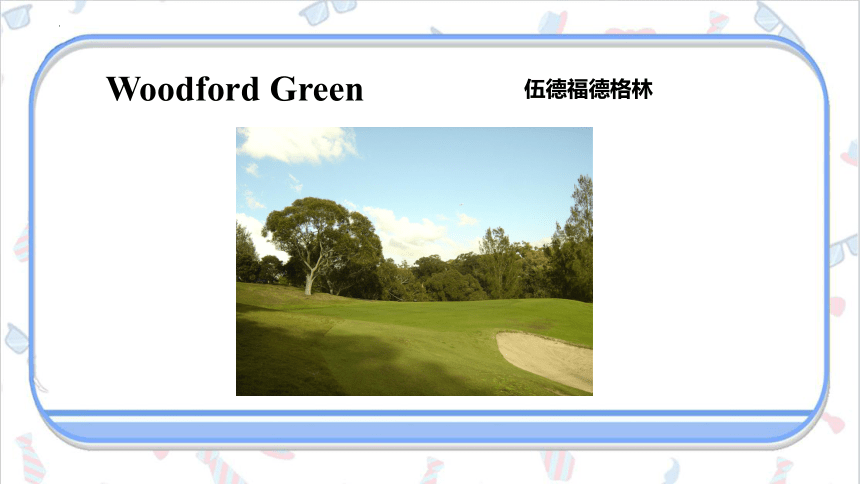
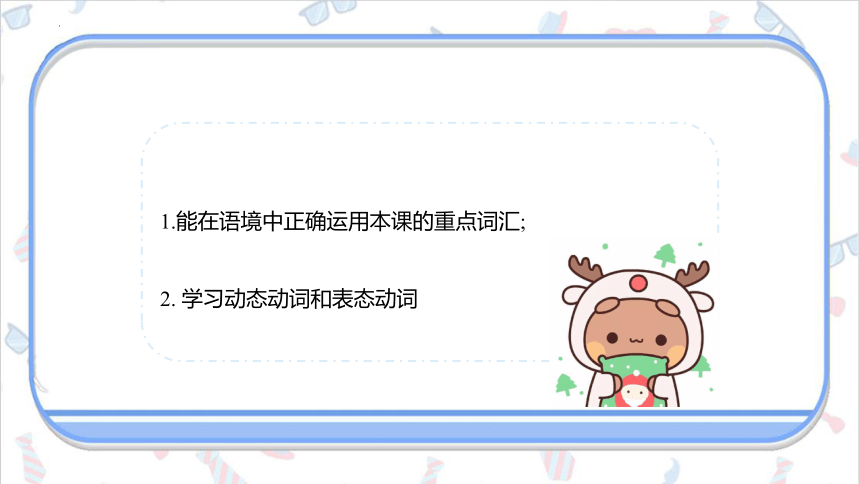



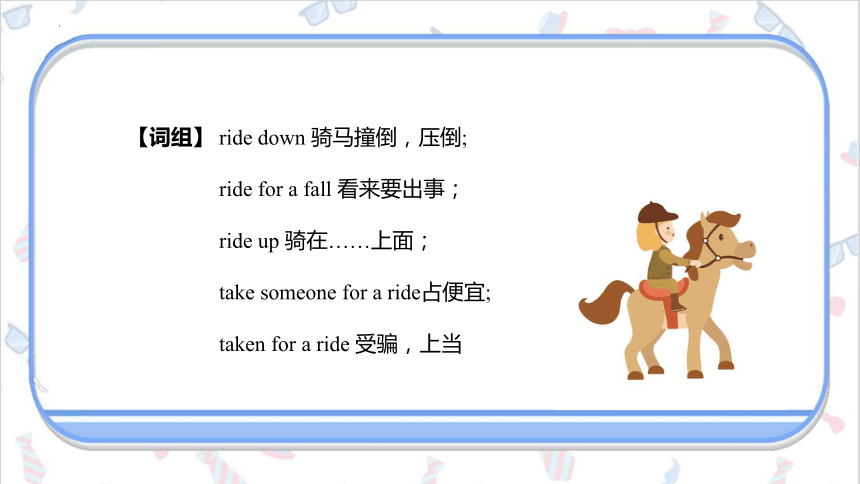
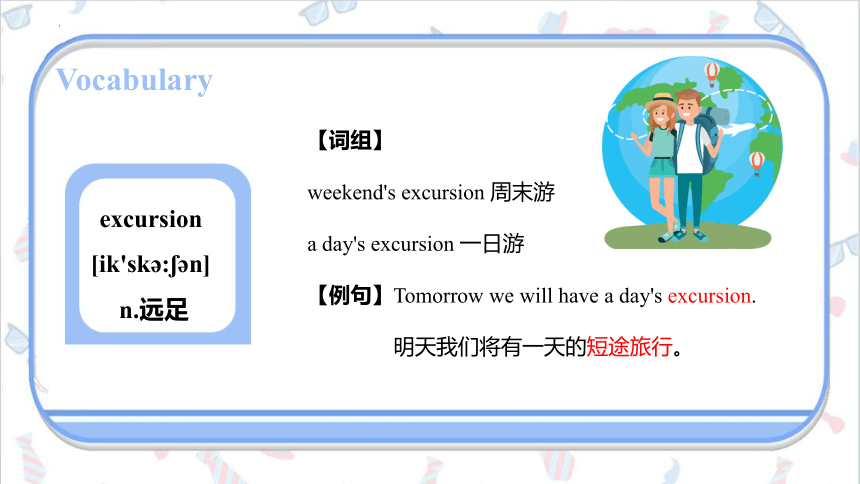
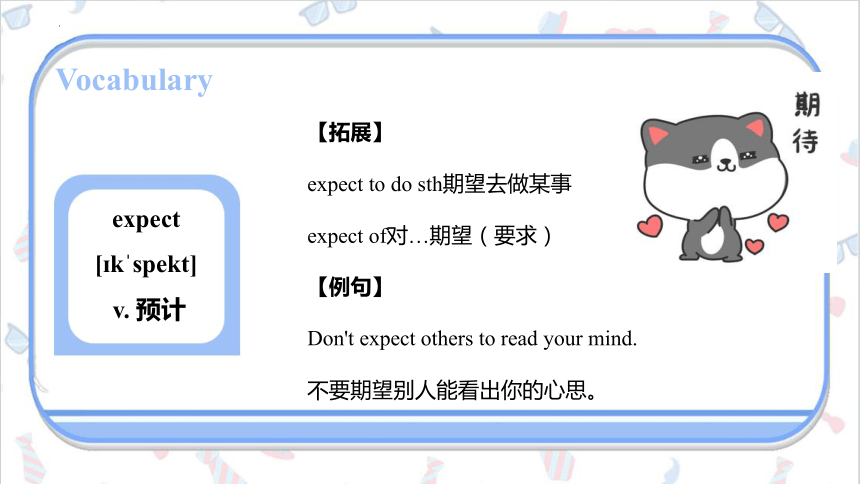
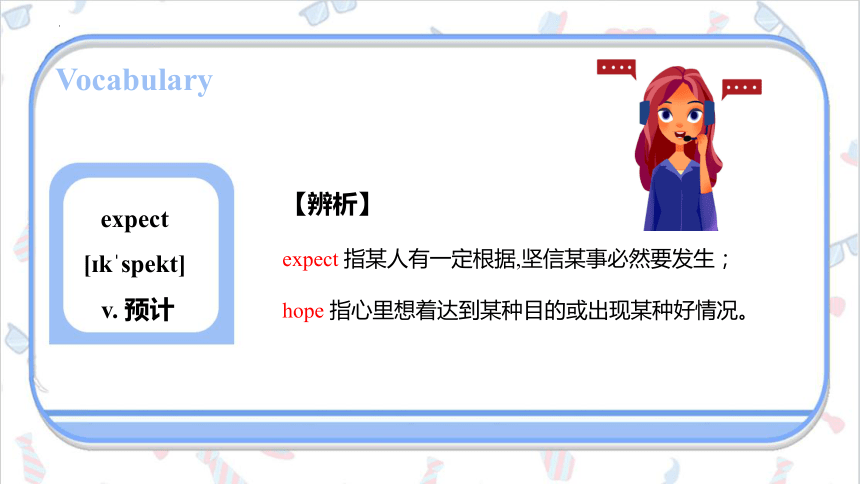
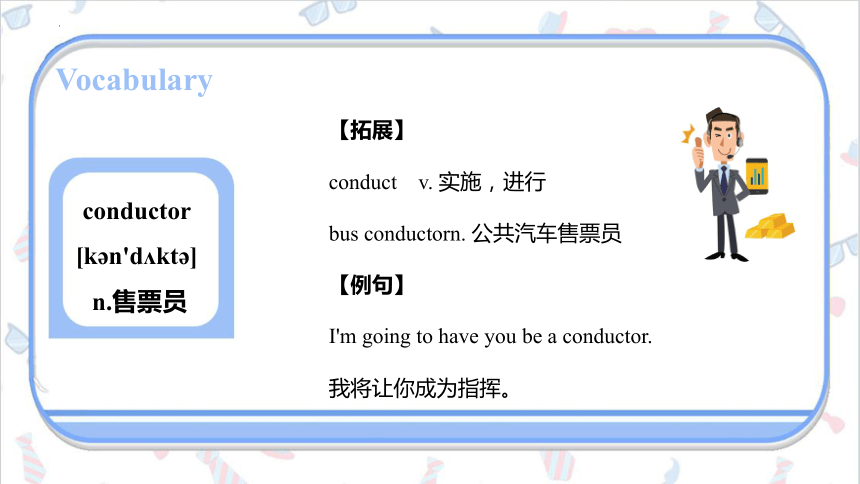
文档简介
(共72张PPT)
Lesson 50
Taken for a ride
乘车兜风
Warm-up
单项选择。
1. _______ the hot weather, he couldn't sleep indoors.
a. Because b. Because of c. As d. For
2. He looked at the bits of wood and metal_______ around him.
a. laying b. laid c. lying d. lied
b
a
Woodford Green
伍德福德格林
1.能在语境中正确运用本课的重点词汇;
2. 学习动态动词和表态动词
Vocabulary
New words and expressions
1 ride [raid] n.旅行
2 excursion [ik'sk : n] n.远足
3 conductor [k n'd kt ] n.售票员
4 view [vju:] n.景色
【要点】
trip n.(出差性的)旅行(旅行地方不远或呆的时间不长)
travel n.(周游世界性的)旅行
journey n.(陆地上的)旅行
flight n.(空中)旅行
voyage n.(海上)旅行
tour n. 游玩
sightseeing n. 观光游
Vocabulary
ride
[raid]
n.旅行
【词组】 ride down 骑马撞倒,压倒;
ride for a fall 看来要出事;
ride up 骑在……上面;
take someone for a ride占便宜;
taken for a ride 受骗,上当
【词组】
weekend's excursion 周末游
a day's excursion 一日游
【例句】Tomorrow we will have a day's excursion.
明天我们将有一天的短途旅行。
Vocabulary
excursion
[ik'sk : n]
n.远足
【拓展】
expect to do sth期望去做某事
expect of对…期望(要求)
【例句】
Don't expect others to read your mind.
不要期望别人能看出你的心思。
Vocabulary
expect
[ k spekt]
v. 预计
【辨析】
expect 指某人有一定根据,坚信某事必然要发生;
hope 指心里想着达到某种目的或出现某种好情况。
Vocabulary
expect
[ k spekt]
v. 预计
【拓展】
conduct v. 实施,进行
bus conductorn. 公共汽车售票员
【例句】
I'm going to have you be a conductor.
我将让你成为指挥。
Vocabulary
conductor
[k n'd kt ]
n.售票员
【拓展】
n. 1. 景色,风景 2. 观点,见解
3.观察,观看,视野
v.看待,观察,考虑
sight n. 景色, 视线, 视野(强调客观)
【例句】Can I have a room with a good view
我可以要一间视野好的房间吗
Vocabulary
view
[vju:]
n.景色
【词组】
in view 在看得见的地方,被考虑
in view of 鉴于……;
with a view to 以……为目的,着眼于
in one's view=in one's opinion 就某人看来
Vocabulary
view
[vju:]
n.景色
短语
lose one’s way 迷路
go on 继续
get a good view 饱览
in the front of 在……前部
Text
Why did the writer not get off the bus at Woodford Green
Where does the writer love travelling
Where did he want to go on his recent excursion
What did the writer realize when the bus stopped
Why didn’t the writer get off at woodford Green
1
2
3
4
I love travelling in the country, but I don't like losing my way. I went on an excursion recently, but my trip took me longer than I expected. ' I'm going to Woodford Green,' I said to the conductor as I got on the bus,' but I don't know where it is.' 'I'll tell you where to get off,' answered the conductor.
I sat in the front of the bus to get a good view of the countryside. After some time, the bus stopped. Looking round, I realized with a shock that I was the only passenger left on the bus. 'You'll have to get off here,' the conductor said. 'This is as far as we go.' 'Is this Woodford Green ' I asked. 'Oh dear,' said the conductor suddenly.' I forgot to put you off.' 'It doesn't matter,' I said. 'I'll get off here.' 'We are going back now,' said the conductor. 'Well, in that case, I prefer to stay on the bus,' I answered.
I love travelling in the country, but I don't like losing my way. I went on an excursion recently, but my trip took me longer than I expected. ' I'm going to Woodford Green,' I said to the conductor as I got on the bus,' but I don't know where it is.' 'I'll tell you where to get off,' answered the conductor.
I sat in the front of the bus to get a good view of the countryside. After some time, the bus stopped. Looking round, I realized with a shock that I was the only passenger left on the bus. 'You'll have to get off here,' the conductor said. 'This is as far as we go.' 'Is this Woodford Green ' I asked. 'Oh dear,' said the conductor suddenly.' I forgot to put you off.' 'It doesn't matter,' I said. 'I'll get off here.' 'We are going back now,' said the conductor. 'Well, in that case, I prefer to stay on the bus,' I answered.
Taken for a ride 乘车兜风
过去分词短语,意为:被骗,还能译为被带着乘车兜风;
take … for … 是“把……当作……”的意思。
taken for a ride 意思是“就当作是一次乘车兜风”;
take sb. for a ride 又作“欺骗”讲,因此 taken for 也有“上当了”的含义。
I love travelling in the country, but I don't like losing my way.
我喜欢在乡间旅行,但却不愿意迷路。
本句是but连接的连个并列句。
第一句主谓宾状结构,主语是I,谓语动词是love,宾语是动名词travelling,状语是in the country.
第二句是主谓宾结构,主语I,谓语动词like,宾语是动名词短语losing my way.
I love travelling in the country, but I don't like losing my way.
我喜欢在乡间旅行,但却不愿意迷路。
lose one’s way =get lost 迷路
lose one’s job 丢掉工作
lose one’s temper 发脾气
lose weight 减肥
love/like/enjoy doing sth.
习俗: Love me, love my dog.
爱屋及乌。
country=countryside=rural area 乡间
city=urban area 城市
I went on an excursion recently, but my trip took me longer than I expected. 我最近去远足了,但这次旅行花的时间比我预计的要长。
这句是 but 连接的两个并列句。
第一句句是主谓宾状结构,主语I,谓语是went on,宾语是an excursion,状语是recently.
第二句是than引导比较状语从句,主句是主谓宾状结构,主语是my trip ,谓语took,宾语是me,状语是longer,状语从句是than I expected,主谓结构,主语I,谓语动词expected.
I went on an excursion recently, but my trip took me longer than I expected. 我最近去远足了,但这次旅行花的时间比我预计的要长。
go on an excursion =have an excursion 作一次短距离的旅行
go on 进行,为(某一目的)而去
I’ll go on holiday next month.
Did you go on a trip last month
take sb. some time 花费某人多少时间
My trip took me a long time.
It takes sb. some time to do sth. 花费某人多少时间
It took me a month to learn book 2.
It takes sb. some time that… 花费某人多少时间
花费 :spend ; cost; take; pay 的用法区别
1. spend 主语为人
句型:sb. spend some time/ some money (in) doing sth.
sb. spend some time/ some money on sth.
2. cost 主语为物
句型:sth cost sb some money
花费 :spend ; cost; take; pay 的用法区别
3. take 句型:
It takes sb some time to do sth. 做某事花费某人多少时间
4. pay for 支付
句型:sb pay money for sth
I went on an excursion recently, but my trip took me longer than I expected. 我最近去远足了,但这次旅行花的时间比我预计的要长。
than I expected 比我所预料的(口语)
You are more beautiful than I expected.
than I thought 比我原以为的
The English class took me longer than I thought.
"I'm going to Woodford Green," I said to the conductor as I got on the bus, "but I don't know where it is".
第一个引语是主系表结构,主语I, 谓语动词was, 表语是现在分词短语going to Woodford Green. 陈述部分是as引导的时间状语从句,主句主谓宾结构,主语I,谓语动词是said to,宾语是the conductor,时间状语从句是主谓宾结构,主语I,谓语动词got on,宾语the bus.
第二个引语是where引导的地点状语从句,主句是主谓状结构,主语是I,谓语know,状语是where it is,从句主系表结构,主语it,谓语是is,表语是where.
'I'll tell you where to get off.' answered the conductor.
“我告诉你在哪儿下车。列车长回答说。
第一句是主谓双宾结构,主语I,谓语动词will tell,间接宾语you,直接宾语是动词不定式短语where to get off,注意这个语法点where to get off是疑问词 加 to do sth,结构,相当于一个名词使用.
第二句是主谓结构,倒装,主语是the conductor, 谓语 answered.
'I'll tell you where to get off.' answered the conductor.
“我告诉你在哪儿下车。列车长回答说。
get on the bus 上车 ;get off the bus 下车
I will tell you where you can (should) get off.
No one got on/off (the bus) at the last bus stop.
'I'll tell you where to get off.' answered the conductor.
“我告诉你在哪儿下车。列车长回答说。
“特殊疑问词+to+动词原形”可用来取代宾语从句
Can you tell me how I can get there =Can you tell me how to get there
Can you tell me what I should do =Can you tell me what to do
I sat in the front of the bus to get a good view of the countryside.
我坐在汽车的前部,以便饱览农村风光。
in front of 和 in the front of 的区别:
in front of 指在某一范围外的前面,其反义词为behind;
in the front of指某一范围内的前部分,有时用at the front of,其反义词是at the back of.
饱览美丽的乡村风光
After some time the bus stopped. 过了一些时候,车停了。
句型分析:
本句是主谓状结构,主语the bus,谓语动词stopped,状语是after some time.
一段时间
Looking round, I realized with a shock that I was the only passenger left on the bus.
我环视了一下身旁,惊奇地发现车里就剩我一个乘客了。
这句是宾语从句。
主句是主谓宾状结构,主语I, 谓语是realized,宾语是that从句,状语1是looking round,状语2是with a shock.
从句是主系表,主语是I,谓语动词was, 表语是the only passenger,后置定语是过去分词短语left on the bus,表被动,被遗留。
"You'll have to get off here,'the conductor said. "This is as far as we go."
"您得在这里下车,”售票员说,“我们的车就到此为止了。”
as far as+句子 (有时so far as)表示直到 为止(表示范围、程度)
e. g. It is as far as I can bear.
I'll help you as far as I can.
'Well, in that case, I prefer to stay on the bus. 'I answered.
“好吧,那样的话,我宁愿呆在公共汽车上。”我回答。
prefer意为“宁可,宁愿,更喜欢”,其主要用法有:
1) prefer doing to doing 比起做,我更喜欢做
e. g. My grandma prefers taking a walk to sitting in front of the TV.
2)prefer to do sth. rather than do sth. 宁愿做某事而不愿做某事。
e. g. He preferred to stay at home rather than go with us.
既然是这/那样
宁愿
'Well, in that case, I prefer to stay on the bus. 'I answered.
“好吧,那样的话,我宁愿呆在公共汽车上。”我回答。
1)in that/this case表示“既然是这/那样”、“假使那/这样的话”
e. g. I left my book, in that/this case,you may have mine.
2)in case 假设万一
e. g. Take the raincoat in case it rains.
3) in case of 假设,万一
e. g. In case of fire,open this safety door.
既然是这/那样
宁愿
其他表达“宁愿”的句型
1)would rather do sth, than do sth. 宁愿做某事,也不愿做某事;
e. g. I would rather watch TV at home than go to the cinema.
我宁愿在家看电视也不愿去看电影。
2)would rather后也可跟从句,表示主语宁愿让某人干某事。这时,从句谓语动词要用虚拟语气,即用一般过去时表示现在或将来要做的事;用过去完成时表示已经做过的事或过去要做的事。
e. g. I'd rather she set out to do the work now.我宁愿她现在就着手做这项工作。
I'd rather you hadn't told him the news that day.
我真希望你那天没有把那个消息告诉他。
1 Why did the writer ask the conductor to help him
(a) He didn't know where he was going.
(b) He didn't know where to get off.
(c) He had lost his way.
(d) He was the only passenger on the bus.
2 Which word best describes the conductor He was________
(a) helpful (b) lazy (c) rude (d) forgetful
Questions:
Grammar
表示习惯性动作
Grammar
表示状态、感觉、情绪、精神活动的动词 appear,appreciate,believe,feel,forget,hear,know,like,look,notice,remember,resemble,see,think,understand,belong to,consist of,contain,desire,detest,dislike,hate,hope,love,matter,mean,mind,need,want,wish 常用于一般现在时而不用于进行时
lose, loose, miss.
lose vt. 失去,丧失,遗失,丢失
Roy has lost his job again.
If you bet on that horse you will lose your money. (bet on sth 就……打赌)
Grammar
Grammar
lose, loose, miss.
loose adj. 松动的,松的,松开的
Servral screws have come loose. (come loose,松了(系动词+adj.))
The handle of this suitcase is very / has come loose.
lose, loose, miss.
miss v. 怀念, 思念, 错过,未能……,缺(课等),惦念,想念
Hurry or you’ll miss the train.
I missed my English lesson.
Grammar
lose, loose, miss.
missing adj. 不见了的
sth. is lost = sth. is missing
missing boy 失踪了的孩子(不能用 “lost” )
Grammar
expect, wait for
Grammar
expect 可以表示“预计……可能发生(或来到),等待,期盼”,它表示等待时往往侧重人的心理而不是具体在某个地方等。
My trip took me longer than I expected.
wait for 主要指“等待”这个动作本身。
I’m waiting for the next bus.
分词作定语
(一)分词作定语单个分词作定语,常位于被修饰词之前;
分词短语作定语,总位于被修饰词之后。
现在分词作定语,多表示“说话时正在进行”或“与谓语动词同时进行”或“经常性的”动作;而过去分词作定语,则多表示分词动作“先于谓语动词表示的动作”或“没有一定的时间性”。
1.分词作定语一般放在被修饰的名词前。
All the leading newspapers reported the trade talks between China and the United States. 所有的主要报纸都报道了中美之间的贸易会谈。
The broken glass has been thrown outside.
破碎的玻璃被扔到外面去了。
分词作定语
2.分词短语作定语一般放在被修饰的名词后,相当于一个定语从句。
例如:The book written by him is very popular.
他写的那本书很受欢迎。
The woman selling vegetables has gone.
卖菜的那个妇女已经走了。
分词作定语
3.分词修饰 anything, nothing, nobody, something, everything 等不定代词或指示代词those时,要放在这些词的后面。
例如:There is nothing inspiring in his words.
他的话中没有什么令人鼓舞的东西。
She is one of those invited. 她是那些被邀请的人之一
分词作定语
分词作表语时,其逻辑主语是句子主语,表示主语的性质、特征或状态。1.现在分词作表语,说明主语的性质或特征,意为“令人怎样……”,有主动意味。如:exciting, moving, amusing, astonishing, frightening, interesting,relaxing, shocking, surprising, terrifying,tiring, worrying 等。
The news is encouraging.这条消息令人鼓舞。
分词作表语
2.过去分词作表语多表示主语所处的状态,意为“对什么感受怎样”,有被动意味。如:excited, moved, amused, astonished, frightened, interested, relaxed, satisfied, surprised, terrified, tired, worried 等。
She felt very tired,她感到很累。
He looked worried,他看上去忧心忡忡。
分词作表语
1)现在分词与过去分词的区别主要表现在语态和时间概念上。在语态上,现在分词(除被动式外)表示主动意思。在时间上,现在分词表示动作正在进行,过去分词则表示动作的完成。
2)现在分词有时态和语态的变化;而过去分词只有一种形式。现在分词的一般式常表“主动”和“进行”;过去分词的一般式常表“被动”和“完成”。
以 make 和 rise 为例,将分词的各种形式列表如下:
例题
It is believed that if a book is________, it will surely ________the reader.
A. interested; interest B. interesting; be interested
C. interested; be interesting D. interesting; interest
答案解析:D,第二个下画线处后接有宾语the reader,因此应填入动词原形interest(指“使……发生兴趣,引起……的兴趣”)与助动词will构成谓语;第一个下画线处应为表示主语abook的性质、状态的表语,因此应填入interest的现在分词形式作表语。
分词的否定式用not加分词构成。
如:Not having done it well enough,I tried again.
我由于做得不够好,所以又试了试。
Not worried about his body,he carried on his plan.
他不顾身体继续执行他的计划。
分词的否定
Grammar
1. This is as far as we go. We don't go _____.
a. any further b. more far c. further more d. so far
2. The writer got on the bus, but he didn't know where to ______.
a. get down b. get off c. get out of d. get over
A
B
Practice
用所给单词或短语的正确形式填空
get a good view of get off go on an excursion
lose one’s way prefer to put sb. off
1.He chose Spain, but personally I’d ________________ go to Greece.
2.I saw my parents the moment I ________________ the train.
3.We should climb high to ________________ the city.
用所给单词或短语的正确形式填空
get a good view of get off go on an excursion
lose one’s way prefer to put sb. off
4.I decided to_________________ deliberately on my second day, since I believed that this was the surest way of getting to know my way around.
5.He invited us to _________________ to Paris after he moved into his new house.
6.I can give you a ride, and I’ll __________________ at the supermarket.
根据汉语提示完成下列句子。
1.—这车不去公园吗?
—不,我们的车就到这为止了。
—Doesn’t the bus go to the park
—No, ________________.
根据汉语提示完成下列句子。
2.虽然很饿,但他宁愿死也不愿意偷窃。
Although he was starving, he ________________ instead of stealing.
3.我吃惊地发现这个开关有毛病。
I found ________________ that there was something wrong with switch.
从[A]、[B]、[C]、[D]四个选项中,选出可以填入空白处的最佳选项。
1. John is the tallest boy in the class, ________ according to himself.
[A]five foot eight as tall as [B]as tall as five foot eight
[C]as five foot eight tall as [D]as tall five foot eight as
2.Somebody called you just now, but I didn’t know ________.
[A]who were they [B]who they were
[C]who was it [D]who it was
3. There is not much difference between the two. I really don’t know ________.
[A]what should I choose [B]which I should choose
[C]which should I choose [D]what I should choose
4.The teacher told the students ________ football on the street.
[A]played [B]to play
[C]not play [D]not to play
用括号内所给单词的适当形式完成句子。
1.He sings ________ (loudly) than anyone I’ve ever heard.
2.Sometimes it’s as ________ (cheap) to buy a new one as it is to repair the old one.
3.I’ll deliver by hand; this will be _________ (expensive) than posting it.
4.He _________ (arrive) at six, and then he will tell us all about the match.
5.He slipped and fell as he _________ (get off) the bus.
All night long he lay awake, _______ (think) of the problem.
用spend、cost、pay和take的适当形式完成句子。
1.I _____two hours on this maths problem yesterday.
2. A new computer _______ a lot of money.
3. It ______ them three years to build this road.
4. I have to _______ them 20 dollars for this room each month.
5. They ______ too much time on the report every week.
用spend、cost、pay和take的适当形式完成句子。
6.--Will you please ______for my dinner, Peter --Sure!
7. This science book _______me a great amount of money.
8. They _______ two years (in) building this bridge.
9. It will ______ me too much time to read this book.
10. The car ________ him around ten thousand US dollars.
Lesson 50
ride
excursion
conductor
view
常见的分词用法
Lesson 50
Taken for a ride
乘车兜风
Warm-up
单项选择。
1. _______ the hot weather, he couldn't sleep indoors.
a. Because b. Because of c. As d. For
2. He looked at the bits of wood and metal_______ around him.
a. laying b. laid c. lying d. lied
b
a
Woodford Green
伍德福德格林
1.能在语境中正确运用本课的重点词汇;
2. 学习动态动词和表态动词
Vocabulary
New words and expressions
1 ride [raid] n.旅行
2 excursion [ik'sk : n] n.远足
3 conductor [k n'd kt ] n.售票员
4 view [vju:] n.景色
【要点】
trip n.(出差性的)旅行(旅行地方不远或呆的时间不长)
travel n.(周游世界性的)旅行
journey n.(陆地上的)旅行
flight n.(空中)旅行
voyage n.(海上)旅行
tour n. 游玩
sightseeing n. 观光游
Vocabulary
ride
[raid]
n.旅行
【词组】 ride down 骑马撞倒,压倒;
ride for a fall 看来要出事;
ride up 骑在……上面;
take someone for a ride占便宜;
taken for a ride 受骗,上当
【词组】
weekend's excursion 周末游
a day's excursion 一日游
【例句】Tomorrow we will have a day's excursion.
明天我们将有一天的短途旅行。
Vocabulary
excursion
[ik'sk : n]
n.远足
【拓展】
expect to do sth期望去做某事
expect of对…期望(要求)
【例句】
Don't expect others to read your mind.
不要期望别人能看出你的心思。
Vocabulary
expect
[ k spekt]
v. 预计
【辨析】
expect 指某人有一定根据,坚信某事必然要发生;
hope 指心里想着达到某种目的或出现某种好情况。
Vocabulary
expect
[ k spekt]
v. 预计
【拓展】
conduct v. 实施,进行
bus conductorn. 公共汽车售票员
【例句】
I'm going to have you be a conductor.
我将让你成为指挥。
Vocabulary
conductor
[k n'd kt ]
n.售票员
【拓展】
n. 1. 景色,风景 2. 观点,见解
3.观察,观看,视野
v.看待,观察,考虑
sight n. 景色, 视线, 视野(强调客观)
【例句】Can I have a room with a good view
我可以要一间视野好的房间吗
Vocabulary
view
[vju:]
n.景色
【词组】
in view 在看得见的地方,被考虑
in view of 鉴于……;
with a view to 以……为目的,着眼于
in one's view=in one's opinion 就某人看来
Vocabulary
view
[vju:]
n.景色
短语
lose one’s way 迷路
go on 继续
get a good view 饱览
in the front of 在……前部
Text
Why did the writer not get off the bus at Woodford Green
Where does the writer love travelling
Where did he want to go on his recent excursion
What did the writer realize when the bus stopped
Why didn’t the writer get off at woodford Green
1
2
3
4
I love travelling in the country, but I don't like losing my way. I went on an excursion recently, but my trip took me longer than I expected. ' I'm going to Woodford Green,' I said to the conductor as I got on the bus,' but I don't know where it is.' 'I'll tell you where to get off,' answered the conductor.
I sat in the front of the bus to get a good view of the countryside. After some time, the bus stopped. Looking round, I realized with a shock that I was the only passenger left on the bus. 'You'll have to get off here,' the conductor said. 'This is as far as we go.' 'Is this Woodford Green ' I asked. 'Oh dear,' said the conductor suddenly.' I forgot to put you off.' 'It doesn't matter,' I said. 'I'll get off here.' 'We are going back now,' said the conductor. 'Well, in that case, I prefer to stay on the bus,' I answered.
I love travelling in the country, but I don't like losing my way. I went on an excursion recently, but my trip took me longer than I expected. ' I'm going to Woodford Green,' I said to the conductor as I got on the bus,' but I don't know where it is.' 'I'll tell you where to get off,' answered the conductor.
I sat in the front of the bus to get a good view of the countryside. After some time, the bus stopped. Looking round, I realized with a shock that I was the only passenger left on the bus. 'You'll have to get off here,' the conductor said. 'This is as far as we go.' 'Is this Woodford Green ' I asked. 'Oh dear,' said the conductor suddenly.' I forgot to put you off.' 'It doesn't matter,' I said. 'I'll get off here.' 'We are going back now,' said the conductor. 'Well, in that case, I prefer to stay on the bus,' I answered.
Taken for a ride 乘车兜风
过去分词短语,意为:被骗,还能译为被带着乘车兜风;
take … for … 是“把……当作……”的意思。
taken for a ride 意思是“就当作是一次乘车兜风”;
take sb. for a ride 又作“欺骗”讲,因此 taken for 也有“上当了”的含义。
I love travelling in the country, but I don't like losing my way.
我喜欢在乡间旅行,但却不愿意迷路。
本句是but连接的连个并列句。
第一句主谓宾状结构,主语是I,谓语动词是love,宾语是动名词travelling,状语是in the country.
第二句是主谓宾结构,主语I,谓语动词like,宾语是动名词短语losing my way.
I love travelling in the country, but I don't like losing my way.
我喜欢在乡间旅行,但却不愿意迷路。
lose one’s way =get lost 迷路
lose one’s job 丢掉工作
lose one’s temper 发脾气
lose weight 减肥
love/like/enjoy doing sth.
习俗: Love me, love my dog.
爱屋及乌。
country=countryside=rural area 乡间
city=urban area 城市
I went on an excursion recently, but my trip took me longer than I expected. 我最近去远足了,但这次旅行花的时间比我预计的要长。
这句是 but 连接的两个并列句。
第一句句是主谓宾状结构,主语I,谓语是went on,宾语是an excursion,状语是recently.
第二句是than引导比较状语从句,主句是主谓宾状结构,主语是my trip ,谓语took,宾语是me,状语是longer,状语从句是than I expected,主谓结构,主语I,谓语动词expected.
I went on an excursion recently, but my trip took me longer than I expected. 我最近去远足了,但这次旅行花的时间比我预计的要长。
go on an excursion =have an excursion 作一次短距离的旅行
go on 进行,为(某一目的)而去
I’ll go on holiday next month.
Did you go on a trip last month
take sb. some time 花费某人多少时间
My trip took me a long time.
It takes sb. some time to do sth. 花费某人多少时间
It took me a month to learn book 2.
It takes sb. some time that… 花费某人多少时间
花费 :spend ; cost; take; pay 的用法区别
1. spend 主语为人
句型:sb. spend some time/ some money (in) doing sth.
sb. spend some time/ some money on sth.
2. cost 主语为物
句型:sth cost sb some money
花费 :spend ; cost; take; pay 的用法区别
3. take 句型:
It takes sb some time to do sth. 做某事花费某人多少时间
4. pay for 支付
句型:sb pay money for sth
I went on an excursion recently, but my trip took me longer than I expected. 我最近去远足了,但这次旅行花的时间比我预计的要长。
than I expected 比我所预料的(口语)
You are more beautiful than I expected.
than I thought 比我原以为的
The English class took me longer than I thought.
"I'm going to Woodford Green," I said to the conductor as I got on the bus, "but I don't know where it is".
第一个引语是主系表结构,主语I, 谓语动词was, 表语是现在分词短语going to Woodford Green. 陈述部分是as引导的时间状语从句,主句主谓宾结构,主语I,谓语动词是said to,宾语是the conductor,时间状语从句是主谓宾结构,主语I,谓语动词got on,宾语the bus.
第二个引语是where引导的地点状语从句,主句是主谓状结构,主语是I,谓语know,状语是where it is,从句主系表结构,主语it,谓语是is,表语是where.
'I'll tell you where to get off.' answered the conductor.
“我告诉你在哪儿下车。列车长回答说。
第一句是主谓双宾结构,主语I,谓语动词will tell,间接宾语you,直接宾语是动词不定式短语where to get off,注意这个语法点where to get off是疑问词 加 to do sth,结构,相当于一个名词使用.
第二句是主谓结构,倒装,主语是the conductor, 谓语 answered.
'I'll tell you where to get off.' answered the conductor.
“我告诉你在哪儿下车。列车长回答说。
get on the bus 上车 ;get off the bus 下车
I will tell you where you can (should) get off.
No one got on/off (the bus) at the last bus stop.
'I'll tell you where to get off.' answered the conductor.
“我告诉你在哪儿下车。列车长回答说。
“特殊疑问词+to+动词原形”可用来取代宾语从句
Can you tell me how I can get there =Can you tell me how to get there
Can you tell me what I should do =Can you tell me what to do
I sat in the front of the bus to get a good view of the countryside.
我坐在汽车的前部,以便饱览农村风光。
in front of 和 in the front of 的区别:
in front of 指在某一范围外的前面,其反义词为behind;
in the front of指某一范围内的前部分,有时用at the front of,其反义词是at the back of.
饱览美丽的乡村风光
After some time the bus stopped. 过了一些时候,车停了。
句型分析:
本句是主谓状结构,主语the bus,谓语动词stopped,状语是after some time.
一段时间
Looking round, I realized with a shock that I was the only passenger left on the bus.
我环视了一下身旁,惊奇地发现车里就剩我一个乘客了。
这句是宾语从句。
主句是主谓宾状结构,主语I, 谓语是realized,宾语是that从句,状语1是looking round,状语2是with a shock.
从句是主系表,主语是I,谓语动词was, 表语是the only passenger,后置定语是过去分词短语left on the bus,表被动,被遗留。
"You'll have to get off here,'the conductor said. "This is as far as we go."
"您得在这里下车,”售票员说,“我们的车就到此为止了。”
as far as+句子 (有时so far as)表示直到 为止(表示范围、程度)
e. g. It is as far as I can bear.
I'll help you as far as I can.
'Well, in that case, I prefer to stay on the bus. 'I answered.
“好吧,那样的话,我宁愿呆在公共汽车上。”我回答。
prefer意为“宁可,宁愿,更喜欢”,其主要用法有:
1) prefer doing to doing 比起做,我更喜欢做
e. g. My grandma prefers taking a walk to sitting in front of the TV.
2)prefer to do sth. rather than do sth. 宁愿做某事而不愿做某事。
e. g. He preferred to stay at home rather than go with us.
既然是这/那样
宁愿
'Well, in that case, I prefer to stay on the bus. 'I answered.
“好吧,那样的话,我宁愿呆在公共汽车上。”我回答。
1)in that/this case表示“既然是这/那样”、“假使那/这样的话”
e. g. I left my book, in that/this case,you may have mine.
2)in case 假设万一
e. g. Take the raincoat in case it rains.
3) in case of 假设,万一
e. g. In case of fire,open this safety door.
既然是这/那样
宁愿
其他表达“宁愿”的句型
1)would rather do sth, than do sth. 宁愿做某事,也不愿做某事;
e. g. I would rather watch TV at home than go to the cinema.
我宁愿在家看电视也不愿去看电影。
2)would rather后也可跟从句,表示主语宁愿让某人干某事。这时,从句谓语动词要用虚拟语气,即用一般过去时表示现在或将来要做的事;用过去完成时表示已经做过的事或过去要做的事。
e. g. I'd rather she set out to do the work now.我宁愿她现在就着手做这项工作。
I'd rather you hadn't told him the news that day.
我真希望你那天没有把那个消息告诉他。
1 Why did the writer ask the conductor to help him
(a) He didn't know where he was going.
(b) He didn't know where to get off.
(c) He had lost his way.
(d) He was the only passenger on the bus.
2 Which word best describes the conductor He was________
(a) helpful (b) lazy (c) rude (d) forgetful
Questions:
Grammar
表示习惯性动作
Grammar
表示状态、感觉、情绪、精神活动的动词 appear,appreciate,believe,feel,forget,hear,know,like,look,notice,remember,resemble,see,think,understand,belong to,consist of,contain,desire,detest,dislike,hate,hope,love,matter,mean,mind,need,want,wish 常用于一般现在时而不用于进行时
lose, loose, miss.
lose vt. 失去,丧失,遗失,丢失
Roy has lost his job again.
If you bet on that horse you will lose your money. (bet on sth 就……打赌)
Grammar
Grammar
lose, loose, miss.
loose adj. 松动的,松的,松开的
Servral screws have come loose. (come loose,松了(系动词+adj.))
The handle of this suitcase is very / has come loose.
lose, loose, miss.
miss v. 怀念, 思念, 错过,未能……,缺(课等),惦念,想念
Hurry or you’ll miss the train.
I missed my English lesson.
Grammar
lose, loose, miss.
missing adj. 不见了的
sth. is lost = sth. is missing
missing boy 失踪了的孩子(不能用 “lost” )
Grammar
expect, wait for
Grammar
expect 可以表示“预计……可能发生(或来到),等待,期盼”,它表示等待时往往侧重人的心理而不是具体在某个地方等。
My trip took me longer than I expected.
wait for 主要指“等待”这个动作本身。
I’m waiting for the next bus.
分词作定语
(一)分词作定语单个分词作定语,常位于被修饰词之前;
分词短语作定语,总位于被修饰词之后。
现在分词作定语,多表示“说话时正在进行”或“与谓语动词同时进行”或“经常性的”动作;而过去分词作定语,则多表示分词动作“先于谓语动词表示的动作”或“没有一定的时间性”。
1.分词作定语一般放在被修饰的名词前。
All the leading newspapers reported the trade talks between China and the United States. 所有的主要报纸都报道了中美之间的贸易会谈。
The broken glass has been thrown outside.
破碎的玻璃被扔到外面去了。
分词作定语
2.分词短语作定语一般放在被修饰的名词后,相当于一个定语从句。
例如:The book written by him is very popular.
他写的那本书很受欢迎。
The woman selling vegetables has gone.
卖菜的那个妇女已经走了。
分词作定语
3.分词修饰 anything, nothing, nobody, something, everything 等不定代词或指示代词those时,要放在这些词的后面。
例如:There is nothing inspiring in his words.
他的话中没有什么令人鼓舞的东西。
She is one of those invited. 她是那些被邀请的人之一
分词作定语
分词作表语时,其逻辑主语是句子主语,表示主语的性质、特征或状态。1.现在分词作表语,说明主语的性质或特征,意为“令人怎样……”,有主动意味。如:exciting, moving, amusing, astonishing, frightening, interesting,relaxing, shocking, surprising, terrifying,tiring, worrying 等。
The news is encouraging.这条消息令人鼓舞。
分词作表语
2.过去分词作表语多表示主语所处的状态,意为“对什么感受怎样”,有被动意味。如:excited, moved, amused, astonished, frightened, interested, relaxed, satisfied, surprised, terrified, tired, worried 等。
She felt very tired,她感到很累。
He looked worried,他看上去忧心忡忡。
分词作表语
1)现在分词与过去分词的区别主要表现在语态和时间概念上。在语态上,现在分词(除被动式外)表示主动意思。在时间上,现在分词表示动作正在进行,过去分词则表示动作的完成。
2)现在分词有时态和语态的变化;而过去分词只有一种形式。现在分词的一般式常表“主动”和“进行”;过去分词的一般式常表“被动”和“完成”。
以 make 和 rise 为例,将分词的各种形式列表如下:
例题
It is believed that if a book is________, it will surely ________the reader.
A. interested; interest B. interesting; be interested
C. interested; be interesting D. interesting; interest
答案解析:D,第二个下画线处后接有宾语the reader,因此应填入动词原形interest(指“使……发生兴趣,引起……的兴趣”)与助动词will构成谓语;第一个下画线处应为表示主语abook的性质、状态的表语,因此应填入interest的现在分词形式作表语。
分词的否定式用not加分词构成。
如:Not having done it well enough,I tried again.
我由于做得不够好,所以又试了试。
Not worried about his body,he carried on his plan.
他不顾身体继续执行他的计划。
分词的否定
Grammar
1. This is as far as we go. We don't go _____.
a. any further b. more far c. further more d. so far
2. The writer got on the bus, but he didn't know where to ______.
a. get down b. get off c. get out of d. get over
A
B
Practice
用所给单词或短语的正确形式填空
get a good view of get off go on an excursion
lose one’s way prefer to put sb. off
1.He chose Spain, but personally I’d ________________ go to Greece.
2.I saw my parents the moment I ________________ the train.
3.We should climb high to ________________ the city.
用所给单词或短语的正确形式填空
get a good view of get off go on an excursion
lose one’s way prefer to put sb. off
4.I decided to_________________ deliberately on my second day, since I believed that this was the surest way of getting to know my way around.
5.He invited us to _________________ to Paris after he moved into his new house.
6.I can give you a ride, and I’ll __________________ at the supermarket.
根据汉语提示完成下列句子。
1.—这车不去公园吗?
—不,我们的车就到这为止了。
—Doesn’t the bus go to the park
—No, ________________.
根据汉语提示完成下列句子。
2.虽然很饿,但他宁愿死也不愿意偷窃。
Although he was starving, he ________________ instead of stealing.
3.我吃惊地发现这个开关有毛病。
I found ________________ that there was something wrong with switch.
从[A]、[B]、[C]、[D]四个选项中,选出可以填入空白处的最佳选项。
1. John is the tallest boy in the class, ________ according to himself.
[A]five foot eight as tall as [B]as tall as five foot eight
[C]as five foot eight tall as [D]as tall five foot eight as
2.Somebody called you just now, but I didn’t know ________.
[A]who were they [B]who they were
[C]who was it [D]who it was
3. There is not much difference between the two. I really don’t know ________.
[A]what should I choose [B]which I should choose
[C]which should I choose [D]what I should choose
4.The teacher told the students ________ football on the street.
[A]played [B]to play
[C]not play [D]not to play
用括号内所给单词的适当形式完成句子。
1.He sings ________ (loudly) than anyone I’ve ever heard.
2.Sometimes it’s as ________ (cheap) to buy a new one as it is to repair the old one.
3.I’ll deliver by hand; this will be _________ (expensive) than posting it.
4.He _________ (arrive) at six, and then he will tell us all about the match.
5.He slipped and fell as he _________ (get off) the bus.
All night long he lay awake, _______ (think) of the problem.
用spend、cost、pay和take的适当形式完成句子。
1.I _____two hours on this maths problem yesterday.
2. A new computer _______ a lot of money.
3. It ______ them three years to build this road.
4. I have to _______ them 20 dollars for this room each month.
5. They ______ too much time on the report every week.
用spend、cost、pay和take的适当形式完成句子。
6.--Will you please ______for my dinner, Peter --Sure!
7. This science book _______me a great amount of money.
8. They _______ two years (in) building this bridge.
9. It will ______ me too much time to read this book.
10. The car ________ him around ten thousand US dollars.
Lesson 50
ride
excursion
conductor
view
常见的分词用法
同课章节目录
